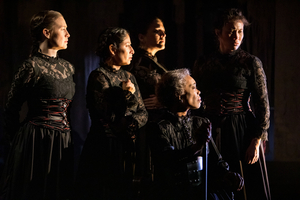Review: Gorgeous and Grim BERNARDA ALBA at Theater Latte Da

A guiding tenet for some theater artists is: If I am going to take the audience on a dark journey, I must do so with great beauty. Theater Latte Da's production of BERNARDA ALBA lives up to this charge. The staging is often gorgeous in this unrelenting examination of pervasive, tragic misogyny in rural Spain of a century or so ago.
John Lachiusa's BERNARDA ALBA is a condensed, musical version of Federico Garcia Lorca's play THE HOUSE OF BERNARDA ALBA, one of a trilogy of plays that great poet and martyr wrote which centered women's lives. It's a rarity in the literature of western theater: it features roles for 10 women (and no men). And yet men--both dead fathers and possible husbands--are central in the thoughts of all the characters.
Bernarda Alba (played by Regina Marie Williams) becomes the head of her household after being widowed twice over. Those events are retold in a masterfully staged ritual opening sequence in this production, blending song, harsh light and shadow, dance, and theatrical storytelling techniques. In addition to the ruling matriarch, we meet her five daughters and her three serving women. We will eventually also meet her aged and deranged mother, who is, literally, a crazy woman in the attic.
I've heard that Lorca's poetry is notoriously difficult to translate such that both meaning and lyricism are fully retained. This is, of course, always a challenge with poetry, but Lorca may be particularly problematic. Certainly the spoken passages in BERNARDA ALBA often seemed flat and clunky. Fortunately, the music Lachiusa has composed is evocative and haunting, using flamenco inspired guitar plus rhythmic clapping and stomping.
Director Crystal Manich and choreographer Kelli Foster Warder build beautifully on that musical base to create stage pictures that are kinetic and varied. Costume designer Alice Frederikson has given the daughters identical black lace bodices, black mantillas, black corsets laced in red, and full floor-length black skirts that they can manipulate: this repetition is a vital ingredient in the visual feast of this show. When we do see people wearing white--on crazy grandma and in an astonishing dreamlike sequence evoking bathing and baptism and in one other moment--it's a shock.
We also see white in the knotted rope decor hanging from the arches that separate a central parlor or courtyard area, women's space, from hallways surrounding it on three sides. These hallway areas are suggestive of stable space, too: vertical slats look like barn framing, and also support a row of pegs on which are hung men's hats, coats, and loops of rope. The actors don these items sometimes to play male characters, and so the visual message is doubled: men's space surrounds and confines the women's space. Scenic designer Kate Sutton-Johnson has created a brilliant set, both realistic and conceptual, which permits lots of movement as well as providing shadowy hiding places.
All the women are confined to this household, where they are supposed to spend their days embroidering their trousseaus, for marriages that may well never happen. It's an atmosphere or repressed sexuality, competition, and despair. And it will lead to tragedy; this play both begins and ends with a death.
The Acting Company here are all fine singers who can manage the harmonies and complex rhythms required of them with considerable polish. They are of diverse ethnicities. Regina Marie Williams sings Bernarda Alba with a raspiness that helps establish her commanding intransigence. She stalks about the stage carrying a brass topped cane, which, as she wields it, is more a scepter or billy club than walking stick. She wears a corset that suggests military discipline and a bodice that foregoes lace--all in black, as befits the household in mourning. Only once, in the bathing dress sequence, do we get a glimpse of the grace and vulnerability she once possessed. In this portrayal, we see the way women can become perpetrators of oppression against one another.
While most of the songs in the score are choral with exposed solo lines, often unaccompanied, each daughter also has a song. Though they are dressed identically, considerable effort is expended to be sure they can be differentiated. The plot centers particularly on Martirio (Meghan Kreidler) and Adela (Stephanie Bertumen); one smolders with resentment, the other with desire, and the results are tragic.
The three women who play the servants are not bit players: they too are roped into the web of duty and compliance. They see more than they say and they have less power to object to their circumstances than even the daughters do. Yet they often display kindness or try to do so. Poncia (Aimee K. Bryant), their leader, tries to keep the girls in line but is also the only character who warns Bernarda that her rules will have consequences.
Music Director Jason Hansen on piano leads an excellent small ensemble, hidden away in what must be a tiny space. Anne Ainomae and Matthew Mindeman play viola; Kristian Anderson is on guitar and mandolin, Greg Angel is on double bass, and Mark Henderson plays flute, clarinet, and oboe.
This is a hard play to perform and a hard play to watch. It is also a dissection of the mechanisms of oppression against women, which are of course still in effect in many places around the world today in ways very like those depicted here. And, as Latte Da's excellent program makes clear, with the excerpt of an essay from Azar Nafisi, written for the premiere of BERNARDA ALBA at Lincoln Center in 2006, we should not be complacent: oppression happens here at home, too.
BERNARDA ALBA runs through February 16. It is not a 'feel good' evening of theater, but there are moments of great beauty, and ideas we ignore at our peril.
Photo Credit: Dan Norman
Add Your Comment
Videos
